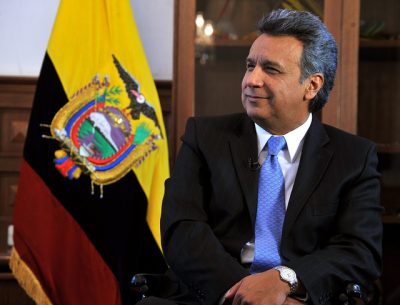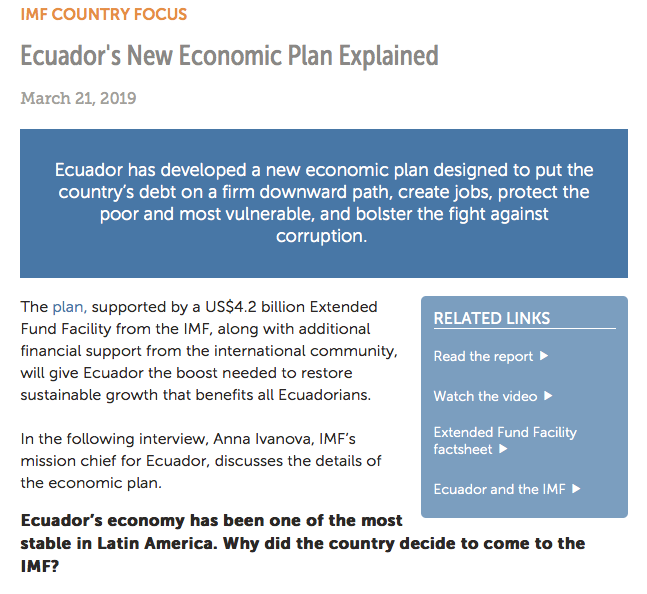Popular Outrage Against Ecuador’s President Moreno. Deadly Wave of IMF Economic Reforms

This important article by Stephen Lendman brings the forefront the insidious role of IMF Economic Medicine.
The policies implemented by Moreno were imposed by the IMF in a March 2019 Report. The Executive Summary of this report is included in Annex to this Article.
****
Lenin Moreno was elected Ecuadorian president in 2017 on a platform of continuing his predecessor’s popular agenda.
During his head of state tenure from January 2007 – May 2017, Rafael Correa invested in healthcare, education, and other social programs.
He opposed loan shark of last resort IMF debt entrapment — obligating borrow nations to grant Western corporations unrestricted market access, privatize state enterprises, institute mass layoffs, freeze or cut wages, slash social benefits, marginalize trade unionism, and crack down hard on nonbelievers.
Since taking office, Moreno betrayed Ecuadorians for Western and internal special interests — notably by instituting neoliberal harshness and privatizations, favoring privileged interests over the general welfare, letting inequality, poverty and unemployment soar.
Ecuadorians know they were betrayed. Last April, they marched en masse in Quito toward the presidential palace.
Displaying banners, saying: “Out with Moreno. Out with the traitor,” police accosted them violently.
Moreno sold his soul to the IMF, the US, and other Western interests — turning Ecuador’s social democracy into a police state, unsafe and unfit to live in for the vast majority of its people.
Last week, he ignited mass outrage by announcing intensified neoliberal harshness, including anti-labor “reforms,” tax changes, and other harsh socioeconomic measures.
Notably he ended decades of fuel and petrol subsidies, largely benefitting ordinary Ecuadorians that especially triggered public outrage, saying:
“I have signed the decree that releases the price of diesel and extra gasoline” — in deference to IMF demands after approving a $4.2 billion loan to Ecuador last winter, he failed to explain.
He called essential services Ecuadorians rely on “wasteful” public spending. Removing petrol subsidies caused prices to spike sharply.
Diesel fuel rose from $1.03 to $2.30 a gallon. Gasoline went from $1.85 to $2.39 a gallon.
His austerity includes a 20% pay cut for public employees, privatizing pensions, along with ending workplace and job security for Ecuadorian workers.
President of the Federation of Urban Transportation of Ecuador Manuel Medina said the following:
“Starting Oct. 3 at midnight we announce the total suspension of all activities regarding transportation as there are no financial resources to face the new price of gasoline.”
Other transport sectors joined the strike action. Suspended two days later, other anti-austerity groups continue their public rage against the anti-populist system.
Knowing his unacceptable policies would ignite public outrage, Moreno declared a nationwide (police) state of emergency, deploying police and military forces in the capital Quito and other Ecuadorian cities.
The IMF praised his actions, a statement saying they’re “aimed at improving the resilience and sustainability of the Ecuadorean economy, and fostering solid and inclusive growth.”
They’re “aimed” at transferring the nation’s wealth from ordinary Ecuadorians to the nation’s privileged class and US-led Western interests.
Correa’s tenure was transformational. His national referendum-approved new constitution and Ecuador’s Citizens Revolution repudiated neoliberal harshness and neocolonialism, his agenda similar to Venezuelan social democracy instituted by Hugo Chavez.
Ecuadorian workers, indigenous people, the leftist Popular Front, and Correa’s Citizen Revolution reject Moreno’s austerity.
Popular rage toppled three earlier anti-populist regimes in the decade before Correa was elected president in 2007.
Will hugely unpopular Moreno be next — despite support from the US-led West, internal business interests, and military leaders?
The only solution to state-sponsored neoliberal harshness is popular revolution, especially against repressive regimes like Moreno’s, featuring police state brutality, including use of live fire on unarmed protesters.
Note: On Tuesday, Telesur reported that Moreno falsely blamed Correa and Venezuelan President Maduro for ongoing public outrage against his repressive policies.
He and other regime officials fled to Guayaquil, what Telesur called “the traditional trench of the far-right and is located near the navy’s main barracks.”
In the past week, hundreds were arrested, unreported numbers dead and injured, reportedly at three killed by repressive security forces.
A Final Comment
Interviewed by RT Spanish, Rafeal Correa denied involvement in days of anti-Moreno protests, saying:
He dismantled popular policies Correa created. During his tenure, “Ecuador’s economy gr(ew), and the growth continued (until) stagnation” under Moreno, calling his economic agenda “inept,” adding:
Ecuador’s Constitution permits the National Assembly to dismiss sitting presidents in times of social unrest.
At the same time, they can dismiss parliament and order a snap election. If held, hugely unpopular Moreno’s tenure as president would surely end unless results were rigged to let him retain power.
Correa: Moreno “knows he will never win fair elections. Democracy is of no interest to him. He takes no interest in the country. He’s thinking only about the power and his own interests,” adding:
“In front of the whole world, the whole Latin America (Moreno) is painting us as putschists in his informational campaign, blames us for trying to destabilize the government.”
“But in reality, they are the true putschists. It’s them who violated the Constitution when it benefited them.”
“It’s them who destabilized the situation in the country. They deprived the people of democracy and stomped on the constitutional order.”
Ecuadorians want Moreno’s repressive neoliberal regime replaced by governance serving everyone equitably, how things were under Correa.
*
Note to readers: please click the share buttons below. Forward this article to your email lists. Crosspost on your blog site, internet forums. etc.
Award-winning author Stephen Lendman lives in Chicago. He can be reached at [email protected]. He is a Research Associate of the Centre for Research on Globalization (CRG)
His new book as editor and contributor is titled “Flashpoint in Ukraine: US Drive for Hegemony Risks WW III.”
http://www.claritypress.com/LendmanIII.html
Visit his blog site at sjlendman.blogspot.com.
click to read full report.
emphasis and comments in brackets added by Global Research
EXECUTIVE SUMMARY
Context: The authorities face a difficult situation. Wage increases have outpaced productivity growth [IMF calls for a reduction in real wages] over the past decade which, has led to a deterioration in competitiveness. This has been exacerbated by a strong U.S. dollar—Ecuador’s economy is fully dollarized—leaving the real exchange rate overvalued. [engineered by Wall Street]
Public debt is high and rising, the government faces sizable gross financing needs, and international reserves are precariously low. The recent volatility in oil prices and tighter global financial conditions have exacerbated these strains.
Article IV: The Article IV discussions focused on diagnosing the nature of the imbalances facing Ecuador and the policy changes that will be needed to address them. At the center of the discussion was the proper calibration of the size, pace, and composition of the reduction in the fiscal deficit that will be needed in the coming years. [implementation of drastic austerity measures] In addition, there was broad agreement that fundamental supply-side efforts will be needed to foster competitiveness, create jobs, rebuild institutions, and make Ecuador a more attractive destination for private investment. Finally, improving the social safety net and increasing the effectiveness of public spending, particularly on health and education, will be essential to achieving strong, sustained, and socially equitable growth.
Program Objectives: Consistent with the findings of the Article IV, the authorities’ policy plan seeks to decisively address the systemic vulnerabilities facing Ecuador. The goals of these policies are to boost competitiveness and job creation, protect the poor and most vulnerable, fortify the institutional foundations for dollarization, [denies Ecuador to have an independent and sovereign monetary policy] and to improve transparency and good governance to public sector operations while strengthening the fight against corruption.
Program Modalities: The proposed program would be a 36-month Extended Fund Facility with access of US$4.209 billion (SDR 3.035 billion, 435 percent of quota) [New loans to pay back outstanding foreign debts, harsh policy conditionalities imposed by creditors]. The program has quarterly reviews and the full amount of Fund resources would be made available for direct budget support. Performance criteria have been established on the non-oil primary balance of the nonfinancial public sector (including fuel subsidies), net international reserves (excluding bank deposits held at the central bank), and on social assistance spending. There are continuous performance criteria to prevent new external payment arrears and to prohibit central bank financing of the nonfinancial public sector (both directly or indirectly through public banks). The program also includes a quarterly indicative target on the overall balance of the nonfinancial public sector.


